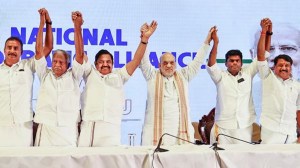Kakaji calls the shots
It was soon after Parkash Singh Badal's government assumed office in Punjab. On a visit to Ludhiana, I discovered to my surprise that the...

It was soon after Parkash Singh Badal8217;s government assumed office in Punjab. On a visit to Ludhiana, I discovered to my surprise that there was a traffic jam in an area like Bhai Randhir Singh Nagar. It seems it was caused because a local Akali leader was getting transport vehicles marshalled through the district transport officer for the cavalcade of Sukhbir Badal, the Chief Minister8217;s son, who was on a visit there. It was a bit disappointing to see that a political party like the Shiromani Akali Dal, which had been voted to power with a massive mandate, was indulging in such gimmicks. Its promise of a corruption-free administration appeared to be nothing more than a vote-catching device. This was confirmed when the state vigilance commissioner admitted that there was no new initiative contemplated by the political authorities for curbing corruption in the administration.
I soon moved to Bihar and kept in touch with Punjab only through the newspapers. A senior IAS officer from Punjab, whom I happened torun into, shocked me by observing that the present government in Punjab was about the worst ever. I learnt a little more about this during my interaction with IAS officers allocated to Punjab at the Lal Bahadur Shastri National Academy of Administration, Mussoorie. This group had come back to the Academy for the last phase of their training after completing their year8217;s field training in various districts of Punjab.
The young officers from Punjab seem to have come away from their districts baffled by the practices of the district officers with whom they were attached. There was mild praise and recognition only for one district officer. One of them narrated an incident in which he was involved in. While he was training as a tehsildar, information came in that some persons were found cutting trees from a piece of land belonging to the Forest Department. He rushed to the spot and found the report to be true. He then got the concerned forest officer to come to the spot as also an ADC from the districtheadquarters and they decided to report the matter to the nearby police station.
Meanwhile the miscreants, under the instructions of a local Akali jathedar, went about their task of cutting the trees and loading the timber on a tractor trolley. When the officials pressed the SHO of the police to arrest the miscreants, the SHO received a call for the ADC from someone known as Kakaji8217;. The young IAS officer did not follow the telephone conversation but the ADC and the forest officer were clearly confused, with the SHO looking at them with a benign smile. His district officer later told him that in today8217;s world an IAS officer must of course know what was correct but he should also know what was prudent and practical.
Another young officer had a similar experience during his training as an executive magistrate when he tried to redress the grievance of a villager who had approached him with the allegation that a local Akali leader had got his sons arrested to settle a personal score with him. He ordered theSHO to produce the boys before him. His order was not obeyed 8212; the SHO just denied that the boys were with him. But a few days later, during the visit of Kakaji8217;, the IAS officer was called to his presence and publicly berated for allegedly casting aspersions on the workers of his party.
But what completely takes the cake is the experience of an IAS officer in one of the most important and sought after districts of Punjab. The district magistrate had asked him to look after the clerical establishment of the district administration. The officer found that there were many positions which attracted a lot of complaints from the public, yet the same people remained in their posts for years together despite the complaints they seemed to evoke. He, therefore, went about formulating a policy for the transfers and postings of clerical staff. He took the paper to the deputy commissioner for his approval but the gentleman avoided a discussion on the subject time and again. One day, however, the young officercornered the deputy commissioner on the subject. The deputy commissioner asked his PA to collect all the recommendatory letters concerning the transfers and postings of clerks that he had received. He asked the letters to be tabulated and then announced his policy to the young IAS officer: only those recommended by Kakaji8217; would get what they wanted, as for the others they were classified according to the status of those who had recommended them!
Yet another interesting episode was narrated by an IAS officer. He had caught a junior officer accepting a bribe and recommended his immediate suspension. He was supported by his deputy commissioner in this. The commissioner, who was his appointing authority, ordered the suspension of the concerned officer with immediate effect. The next day, the IAS officer thought of calling on the commissioner to thank him for his prompt action. The commissioner8217;s PA told him that he was welcome to do so but the junior officer who had been suspended had since been reinstated on8220;orders from above8221;. The suspended gentleman later personally presented himself before the IAS officer, promising good conduct in the future. He explained that he just could not afford another adverse report because he had had to shell out a sum of Rs 1 lakh in order to get his reinstatement order from Chandigarh!
Generally disappointed by their district officers, the young officers turned to their seniors at the state headquarters for inspiration and guidance. They found that many of the senior officers had no time for them and did not seem interested in sharing their experiences either. Most of the senior officers whom they met were a frustrated lot. One of them had, as a sub-divisional magistrate, refused to accept the recommendation of a minister for an arms licence and was consequently transferred from the sub-division. He explained to the young officers that if they choose to stand up for principles, they would suffer for it throughout their careers. If, however, they submitted to thepowers-that-be, life would be both enjoyable and easy for them.
This startling absence of good role models for IAS officers of the Punjab cadre should be a matter of serious concern for everyone who has the good of the state at heart. Perhaps one should employ the words of Jesus Christ to describe the present generation of IAS officers: 8220;If salt lost its savour with what can it be salted?8221;
The writer is a former election commissioner and chief secretary, Punjab
- 01
- 02
- 03
- 04
- 05































